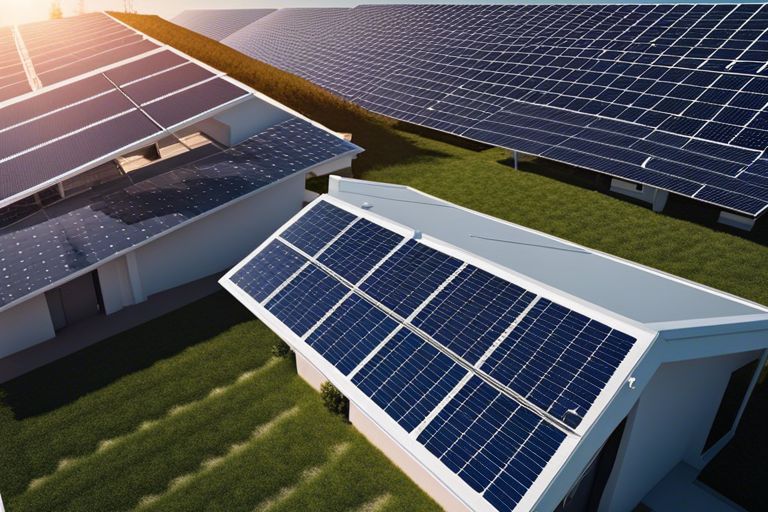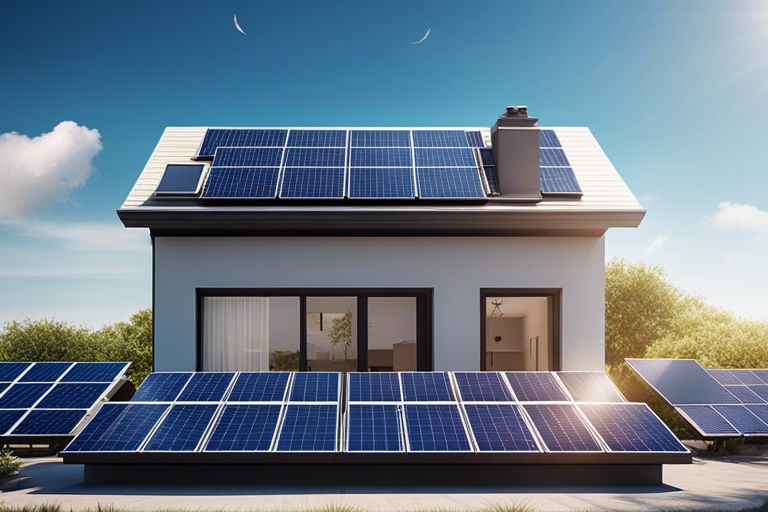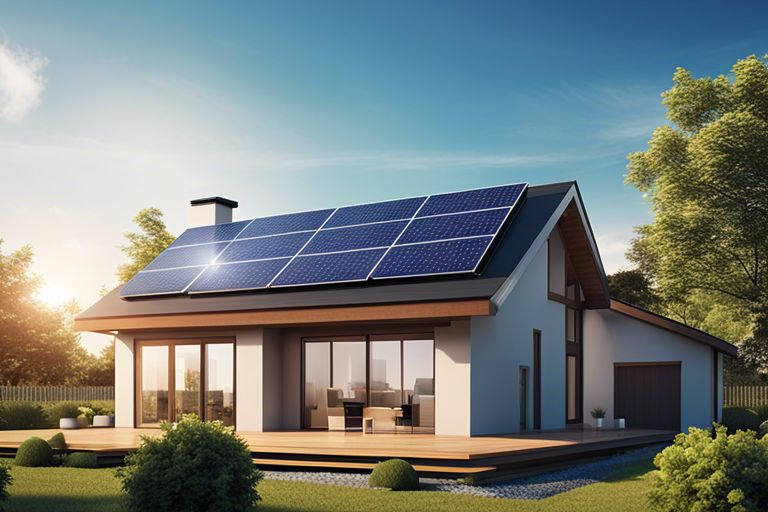House energy efficiency is crucial. For your 1200 sq ft house, determining how much solar power you need is crucial. Understanding your daily energy consumption and sunlight exposure will help in calculating the adequate solar system size for your home.
Key Takeaways:
- Calculate your daily energy usage: Determine how much electricity your household consumes on a daily basis to help estimate the size of solar panel system needed.
- Consider the roof space: The amount of solar panels required will depend on the available roof space on your 1200 sq ft house.
- Consult with a solar energy provider: Seeking advice from a professional can help you accurately assess the solar panel needs for your home.
- Factor in your location: The amount of sunlight your location receives will impact the efficiency of your solar panels, affecting the necessary size of the system.
- Account for energy storage options: If you plan on using batteries to store excess energy generated by the solar panels, the size of the system may need to be adjusted accordingly.
Determining Your Energy Needs
Calculating Your Energy Consumption
The first step in determining how much solar power you need for your 1200 sq ft house is to calculate your energy consumption. This involves looking at your past utility bills to see how many kilowatt-hours (kWh) of electricity you typically use in a month. You can also use online tools to estimate your energy usage based on the appliances and devices you have in your home.
Factors Affecting Energy Usage
The amount of energy your house consumes can be influenced by various factors. These include the size of your house, the number of occupants, the climate you live in, and the energy efficiency of your appliances and home insulation. Any changes you make to these factors can impact how much solar power you will need to meet your energy needs.
- Your house size and layout
- Number of occupants in your household
- Climate and weather conditions in your area

Assessing Your Solar Potential
Evaluating Your Roof’s Solar Exposure
Roofs play a crucial role in harnessing solar energy for your home. To determine the solar potential of your roof, you need to assess its exposure to sunlight throughout the day. South-facing roofs typically receive the most sunlight in the northern hemisphere, making them ideal for solar installations. However, east and west-facing roofs can also be viable options, depending on your energy needs and location.
Shading and Obstructions
Solar panels need direct sunlight to generate maximum energy, so it’s crucial to evaluate any potential shading or obstructions on your roof. Trees, nearby buildings, or even chimneys can cast shadows that reduce the efficiency of your solar system. Consider trimming trees or adjusting the placement of panels to optimize sunlight exposure and maximize your energy production.
Your solar potential can be significantly impacted by shading and obstructions, so take the time to assess and address any potential barriers that may limit the effectiveness of your solar installation. By optimizing your roof’s exposure to sunlight, you can ensure that your solar system operates at peak efficiency and helps you achieve your renewable energy goals.

Sizing Your Solar System
Despite the size of your house, determining the right amount of solar panels for your 1200 sq ft home is crucial. Calculating your solar panel requirements involves factors such as your average daily energy consumption, the efficiency of the solar panels, and the amount of sunlight your location receives.
Calculating Your Solar Panel Requirements
On calculating your solar panel requirements, you need to consider your daily energy usage in kilowatt-hours (kWh), which can be found on your utility bills. By dividing your daily energy usage by the peak sunlight hours in your area, you can estimate the number of solar panels needed to cover your energy needs. Remember to account for factors like shading and panel tilt to ensure accurate calculations.
Considering Energy Efficiency Upgrades
On considering energy efficiency upgrades, making your home more energy-efficient can significantly reduce the number of solar panels needed to power your 1200 sq ft house. Simple upgrades like installing LED lighting, improving insulation, and upgrading to energy-efficient appliances can lower your overall energy consumption, making your solar system more cost-effective in the long run.
Your investment in energy efficiency upgrades not only reduces your reliance on a larger solar system but also helps lower your electricity bills and decrease your environmental impact. Prioritizing energy efficiency alongside your solar panel installation can lead to a more sustainable and economical energy solution for your 1200 sq ft home.
Panel
Keep in mind that working with a professional solar installer can help you accurately assess your energy needs and determine the optimal solar panel system size for your 1200 sq ft house. By combining energy efficiency improvements with the right size solar system, you can create a customized energy solution that suits your needs and budget.
Types of Solar Panels
All solar panels fall into three main categories: monocrystalline, polycrystalline, and thin-film. Each type has its own unique characteristics that can affect the efficiency and cost of your solar system. Here is a breakdown of the different types of solar panels:
- Monocrystalline Panels
- Polycrystalline Panels
- Thin-Film Solar Cells
You can learn more about how many solar panels you need for your 1200 sq ft house by using a solar panel calculator. How Many Solar Panels Do I Need? Calculate for Your …
Monocrystalline vs. Polycrystalline Panels
Types of solar panels and their specifications are important to consider when deciding on the best solar panels for your 1200 sq ft house. Monocrystalline panels are known for their higher efficiency rates due to their single-crystal structure, while polycrystalline panels are more cost-effective but less efficient. Both types can be suitable for residential applications, depending on your budget and space availability.
Thin-Film Solar Cells
The thin-film solar cell technology offers a lightweight and flexible alternative to traditional solar panels. These cells are made by depositing one or more thin layers of photovoltaic material onto a substrate. Although thin-film solar cells are less efficient than crystalline panels, they can be a great option for roofs with limited weight-bearing capacity or irregular shapes.
The thin-film solar cells are often used in building-integrated photovoltaics, where the solar panels blend seamlessly into the architecture of the house. They are also less sensitive to high temperatures and partially shaded conditions compared to crystalline panels, making them a versatile choice for residential solar installations.
Installation and Cost Considerations
Roof-Mounted vs. Ground-Mounted Systems
Not sure whether to install your solar panels on the roof or on the ground? Roof-mounted systems are more common and can be a great space-saving option for smaller properties like a 1200 sq ft house. They are usually less expensive to install since they utilize existing structures. However, ground-mounted systems may be more efficient if your roof is not well-suited for solar panels due to shading or orientation issues.
Inverters and Battery Backup Options
Installation of inverters is necessary for converting the direct current (DC) electricity generated by solar panels into usable alternating current (AC) electricity for your household appliances. Additionally, you may want to consider battery backup options to store excess energy generated during the day for use at night or during power outages.
Another factor to keep in mind is that while inverters are necessary components of a solar system, battery backups are optional and can add to the overall cost of your solar installation.
Installation Costs and Financing Options
Cost is always a crucial consideration when deciding to install solar panels on your 1200 sq ft house. Installation costs can vary based on factors such as the size of your system, the type of panels, your location, and any additional features like battery storage. You may also want to explore financing options such as solar loans, leases, or power purchase agreements to help make the upfront costs more manageable.
Financing your solar system can help you enjoy the long-term benefits of lower energy bills and increased property value without having to pay the full cost upfront. It’s necessary to consider both the installation costs and financing options to determine the best approach for your solar project.
Local Building Codes and Incentives
Compliance with Local Building Codes
With your 1200 sq ft house, you’ll need to ensure that your solar panel installation complies with local building codes. These codes are put in place to ensure the safety and structural integrity of your home. It’s important to check with your local authorities or a professional solar installer to make sure your system meets all the necessary requirements.
Federal and State Incentives for Solar Adoption
Building your solar system for a 1200 sq ft house may qualify you for various federal and state incentives that can help offset the initial cost of installation. Federal incentives like the Investment Tax Credit (ITC) can provide you with a significant tax break based on a percentage of the system’s cost. Additionally, many states offer rebates, grants, or performance-based incentives to encourage homeowners like you to switch to renewable energy sources.
State incentives can vary widely, so it’s crucial to research what programs are available in your area. These incentives can make solar energy more affordable and accessible, making it a smart investment for your 1200 sq ft home.
To wrap up
To wrap up, when considering how much solar you need for a 1200 sq ft house, it’s vital to calculate your energy consumption accurately. By determining your average daily kilowatt-hour usage, you can estimate the number of solar panels required to meet your energy needs. Remember that factors like your location, roof orientation, and shading can also impact the efficiency of your solar system. Consulting with a professional solar installer can help you tailor a solar solution that best suits your home’s energy requirements.
FAQ
Q: How do I determine how much solar I need for a 1200 sq ft house?
A: To determine how much solar energy you need for a 1200 sq ft house, you should first assess your household’s energy consumption. This can be done by looking at your utility bills to see how many kilowatt-hours (kWh) you use on average per month. You can then use this information to calculate how many solar panels you need to generate enough energy to cover your usage. Factors like your location, roof angle, and shading should also be taken into consideration.
Q: What size solar system is recommended for a 1200 sq ft house?
A: On average, a 1200 sq ft house may require a solar system that ranges from 3 to 5 kilowatts (kW) in size. However, this can vary depending on factors such as your energy consumption habits, the efficiency of the solar panels, and the amount of sunlight your location receives. It is best to consult with a solar energy expert who can assess your specific needs and recommend the ideal system size for your 1200 sq ft house.
Q: How much does it cost to install solar panels on a 1200 sq ft house?
A: The cost of installing solar panels on a 1200 sq ft house can vary widely depending on factors such as the size of the system, the type of solar panels used, your location, and any additional equipment or services required for the installation. On average, the cost can range from $10,000 to $20,000. However, there are government incentives, rebates, and financing options available that can help offset the initial investment in solar energy for your home.
